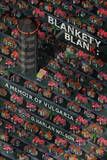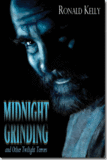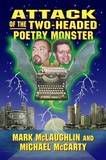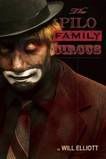Splattered Beauty / Brandon Ford
 Arctic Wolf Publishing / December 2008
Arctic Wolf Publishing / December 2008
Reviewed by: Michele Lee
Brandon Ford's unabashed homage to splatter movies and scream queens centers on Alyssa Peyton, a washed up has-been B-movie queen lost in a world of depression and substance abuse after being abandoned by her producer husband for a newer model. After quite a bit of crazy behavior, several drums of whiskey and enough Percocet to kill an elephant, Alyssa comes up with a plan to get herself back on top.
With an adoring fan she meets at a convention by her side, whispering reassurances and words of absolute devotion in her ear, Alyssa begins to act out her best role ever, turning the scream queen cliché on its ear by being the first movie serial killer ever — in real life.
The book wants very badly to be a B-class horror movie, and it succeeds. It's cheesy and clichéd, with a skewed vision of women, lesbians and the world at large. The forensics and police procedures are less about accuracy and more about getting the desired effect. Plus, there are more descriptions of Alyssa's breasts (what they're doing now and what they are covered – or not covered – by) than any other part of any character.
That said, the book manages to successfully attain its goals by adding a strong visual quality to the story. The science might not be accurate, and the characters might not be likable, but the dramatic, descriptive moments of blood on perfect breasts or a razor glinting through the night air are strong enough to be nearly visual.
Splattered Beauty is not a book for readers looking for something new, or a redefining of the horror genre. It’s for readers who can't get enough of blood, crazy killers and beautiful women.
Purchase Splattered Beauty by Brandon Ford.
Ghost Music / Graham Masterton
 Severn House Publishers / March 2009
Severn House Publishers / March 2009
Reviewed by: T.E. Lyons
Pull the lens back far enough and ghost stories have only two concerns: “how do they appear?” and “why do they appear?” Exploration of that how and why can reveal longings unobtainable from the human experience. It can also reveal soul-seizing horror that cannot be dispelled, since its source and possible vindication is forever out of reach. Everything else is in the details — important as those may be to the reading experience.
Graham Masterton knows about all kinds of longings, and how some hope to quench that which is beyond reach, from his experience editing Britain’s Penthouse edition, as well as his many works in horror fiction. His newest hardcover novel reveals its ghost story pedigree in the title. Ghost Music ultimately succeeds by blending measures of many literary skills. For each of the very few elements that are strained, there’s a surfeit of compensating expertise on display.
Gideon Lake is a composer of movie and television scores and advertising jingles. Upon moving to an apartment in Manhattan, he’s swept into an affair with one of the downstairs neighbors. Gideon, a bit of a loner but not to extremes, is shocked at how quickly he has fallen for this woman…and then stunned when she asks him to fly overseas to meet some of her friends. She insists that he shouldn’t be concerned over how her callous husband might react. Once the composer begins to meet these friends – who are all over Europe – he, for quite understandable reasons, begins to lose his composure: In each new setting they visit, he has visions of their hosts being terrorized, blackmailed…and worse.
Details can be so important to dressing up the basic ghost story, and once you’ve read Masterton, it’s difficult to imagine a better hand at them. The full spectrum of high and low culture plays out on these pages, without ever upsetting the pace. Mutual exploitation of classes is a theme here, but it’s never telegraphed to the detriment of a quick-but-involving read, where characters are awed at world-class museums on one page and swearing at overpriced café service the very next. Lake does not fit the model for a composer whose artistic temperament sweeps him into a ghost story boiling with passion. Our “hero” wants to see himself as better than film composer John Williams; his mysterious lover-muse has him pegged when she says “Just because you can tinkle out some catchy little jingle about toilet freshener, you think you’re some kind of modern-day Mahler.”
Around a few unfortunate narrative corners, Masterton’s choices can seem arbitrary. For example, the polar extremes of romantic gothic and torture-porn coexist here — but there’s some imbalance favoring the latter. And a countdown element is an artifice that’s completely unnecessary to the sustained tension of this very good story. Focus your reading instead more on how the author dares to play with expectations. I can’t recall a successful ghost novel that let so much foreshadowing unspool in the early pages. Also, the villainy here ties to the coveting of real estate — while holding the more-traditional, operatic concern of familial revenge as a trump card. To flip these pages is to let yourself be tied to an incorrigible and irresistible string-puller who delights in inverting clichés while thrilling readers.
Purchase Ghost Music by Graham Masterton.
Blankety Blank: A Memoir of Vulgaria / D. Harlan Wilson
 Raw Dog Screaming Press / January 2009
Raw Dog Screaming Press / January 2009
Reviewed by: Martel Sardina
What is “bizarro” fiction? I’ve been wondering what the answer to that question is since the first time I heard the term while sitting next to the people who run Eraserhead Press back at the 2008 World Horror Convention.
According to the folks at Bizarro Central, “bizarro” is the genre of the weird. Literature’s equivalent to the cult section at the video store. Bizarro authors strive to write fascinating, thought-provoking stories that are above all, fun to read.
Evaluating D. Harlan Wilson’s Blankety Blank: A Memoir of Vulgaria based on the above statement is easy. He has successfully met the genre’s expectations.
Evaluating Wilson’s work in the manner that I generally would, has thrown me for a loop.
If I were writing a “normal” review, the first thing I’d have to take Wilson to task for is creating characters that are believable. While there are many interesting events occurring, I found it hard to care about the characters and why they were doing what they were doing. The book is filled with characters that have no redeeming social value. My second criticism would be about the plot (or lack thereof). This book reminded me of the TV show Seinfeld, quirky characters, interesting events, but at the end of the day, really was a show about nothing.
Throughout the novel, the reader is subjected to Wilson’s digressions on a variety on subjects. From the history of the werewolf to statistics on bullying to quotations to haiku poetry. These digressions were often entertaining. How often can you say that you learned how to make a shrunken head in the course of reading a work of fiction? While Wilson’s observations and essays are informative, I submit, dear reader, that you may be dealing with an unreliable narrator. Consider yourself warned.
If I were writing a “normal” review, I would probably not recommend that anyone read this book. In the real world, Wilson’s idea of storytelling just doesn’t work. A “normal” reader would not stand for the sheer number of viewpoint shifts that occur nor being forced to read a page and a half of the phrase “blankety blank” typed numerous times. However, I’m not writing a “normal” review. I’m writing a “bizarro” review.
If you are the type of reader who can open your mind to alternate histories, worlds where absurdity becomes reality, and stories that know no limits, I’d encourage you to give Wilson’s work a try. Whether you wind up loving it or hating it, the experience of reading him once is well worth the price of admission.
Purchase Blankety Blank: A Memoir of Vulgaria by D. Harlan Wilson.
Midnight Grinding / Ronald Kelly
 Cemetery Dance / March 2009
Cemetery Dance / March 2009
Reviewed by: Blu Gilliand
Growing up in the Deep South, Ronald Kelly was surrounded by storytellers. Not writers, mind you - natural-born storytellers, people for whom sharing tales came as naturally as breathing air. Kelly spent his formative years soaking in the tall tales and legends of his Middle Tennessee homeland, along with a steady diet of EC Comics, "Creature Feature" movie marathons, and classic works by masters like Matheson and King. Each and every one of these influences can be felt in his new short story collection from Cemetery Dance, Midnight Grinding.
Southern atmosphere practically seeps from the pages of Grinding. As a Southern boy myself, I recognize the landscapes and real-life characters that Kelly was drawing from when writing these stories; I could practically see the kudzu and smell the honeysuckle while working through the collection. There's an authenticity here that can't be faked. That real sense of place, along with Kelly's genuine style and voice, elevates the material in this book.
The stories in Grinding are presented in mostly chronological order, which gives readers a real sense of the growth of Kelly's abilities as the collection progresses. In the early stories, Kelly is really wearing his EC Comics influences on his sleeve - the stories are short, lean on characterization but packing a gut punch. Parasitic creatures crawl from hiding places deep in kudzu; serial killers stalk the highways and backroads; and man meets wild with horrifying results. Later on, the stories become more complex and Kelly's voice becomes more assured. He's still telling monster stories, but he's also taking the time to explore more complex themes within the framework.
But simple or complex, the reality is the stories are good. They are the kinds of stories that invite retelling, and that have plenty of nooks and crannies for the storytellers to add their own embellishments. Like any good legend, these are the kinds of stories that take on a life of their own. They are the kinds of stories that demand to be retold around campfires, or perhaps by candlelight during one of those violent thunderstorms that rage across the South in springtime.
Kelly's been away from the writing business for ten years. Let's hope this collection, along with his forthcoming novel (also due from Cemetery Dance), is a permanent reintroduction. Storytelling is one of our most treasured traits, and Kelly is too strong a practitioner to slip away again.
Purchase Midnight Grinding by Ronald Kelly.
Attack of the Two-Headed Poetry Monster / Mark McLaughlin & Michael McCarty
 Skullvines Press / August 2008
Skullvines Press / August 2008
Reviewed by: Michele Lee
Attack of the Two-Headed Poetry Monster by Mark McLaughlin and Michael McCarty is a slim volume of poetry with a little of everything, from Jeff Strand style puns and cheesy humor to soulful, evocative stanzas more similar to Edgar Allan Poe and Clive Barker.
It's an all-in-one tribute to poetry form and traditions as well as the history of horror, from oral stories of the things that go bump in the night to modern day pop culture terrors. Nearly every part of horror has a representative. Pieces like "Hansel and Gristle" and "Ratpunzel" cover twisted fairy tales while "Of Thee I Sing" plays with dark patriotism and government conspiracies. Supernatural beasts and human horrors all get their time in the spotlight from McLaughlin and McCarty.
There are a variety of cultural flavors as well, with poems such as "Making Out With Kali", a surprisingly meaningful tale that's lust on the outside and the human habit of being attracted to our own demise at its soft center.
Even poems that seem as light and silly as "My Cannibal Girlfriend" have the potential to hit readers like an Ambrose Bierce style satire with lines like:
It ain’t easy marrying
a cannibal girlfriend.
Your matrimony ceremony
is a strange combo
of wedding, funeral and
all-you-can-eat buffet.
Attack of the Two-Headed Poetry Monster is an excellent addition to the horror genre and it's no wonder that it's been nominated for a Stoker Award this year. The prose isn't always decadent in richness, but McLaughlin and McCarty are deft, if not clever writers who show an ability to communicate in a variety of ways and to a variety of readers with this poetry collection.
Purchase Attack of the Two-Headed Poetry Monster by Mark McLaughlin and Michael McCarty.
The Suicide Collectors / David Oppegaard
 St. Martin’s Press / December 2008
St. Martin’s Press / December 2008
Reviewed by: Rick R. Reed
Synopsis: The Despair has plagued the earth for five years. Most of the world’s population has inexplicably died by its own hand, and the few survivors struggle to remain alive. A mysterious, shadowy group called the Collectors has emerged, inevitably appearing to remove the bodies of the dead. But in the crumbling state of Florida, a man named Norman takes an unprecedented stand against the Collectors, propelling him on a journey across North America. It’s rumored a scientist in Seattle is working on a cure for the Despair, but in a world ruled by death, it won’t be easy to get there.
Review: Tales of the world going to hell in a hand basket are not hard to find. If there isn’t already, there should be a genre called ‘Apocalyptic’ for books like The Stand, I Am Legend, Angel Land, The Road, Emergence, Oryx and Crake, and many others. So, it isn’t an easy task to wriggle in to territory already traveled by the likes of Stephen King, Cormac McCarthy, and Margaret Atwood and stake your claim with a debut novel in this vein.
But David Oppegaard is just ballsy enough to do so with The Suicide Collectors, his nourish post-apocalyptic version of a world that has been decimated by a plague known as The Despair. Oppegaard’s vision is bleak, inspired, and wholly original, a debut novel elevated to stand on its own, ready to take on the mantle of modern-day classic. No, I’m serious here. The Suicide Collectors is that good.
Unlike other visions of a bleak world where most of the population is wiped out, The Suicide Collectors does not rely on tried and true killers such as viruses or government wartime weapons gone awry. The Despair has engulfed the world with depression, deep dark depression that offers no relief except that found in suicide. We have faced the enemy and he is us.
Oppegaard puts it succinctly in this passage:
“Think of all the people who have died on this planet the past millions of years. Think of all the tortured souls who could, hypothetically, be walking the face of the planet…You add up all those souls and you have a lot of negative energy. Well, maybe all that negative energy has found a place to…unify in its desire for revenge on the living, breathing people who still enjoy a world they no longer have any access to…”
This is one of those books that succeed on more than one level: it’s a contemplation of death, a treatise on the bleakness that lives in all of our hearts, an homage to hope and human perseverance, and simply a damn good, page-turning read.
The Collectors themselves are evidence of the kind of chilling and horrific imagery debut author Oppegaard already commands. These are dark, hooded figures who come, like carrion, to collect the dead after yet another suicide has taken his or her own life. They are the stuff of nightmares and no one dares stand up to them, until at last, our hero—a regular guy named Norman—blows one of the Collector’s heads off when they come to take the body of his beloved wife, freshly dead from an overdose of sleeping pills. And thus begins the narrative impetus for the book, which is at once a journey, an escape, a road tale, and a kind of love story, but not between characters, but for the indefatigable well of life.
You can read this book as a thought-provoking commentary, a dire cautionary tale, or as a horror story (and its horrors are many…and fresh: images like wild, hatchet-wielding children, ghostly tankers filled with the recently dead, and a death-loving cult offering up its latest sacrifice to the insatiable and mysterious “Source” linger in the memory). On whatever level you read The Suicide Collectors, it is sure to remain with you, its spare prose and startling images cropping up days after you have closed the book.
Purchase The Suicide Collectors by David Oppegaard.
Columnist Rick R. Reed is the author of ten novels and has short fiction in more than twenty anthologies. He lives in Seattle, WA. Find out more about the author at his website.
The Pilo Family Circus / Will Elliot
 Underland Press / March 2009
Underland Press / March 2009
Reviewed by: Blu Gilliand
Full disclosure time: I hate clowns. Loathe them. Detest them with every fiber of my being. They do not make me laugh. They make me nervous. At times, they scare the living you-know-what out of me.
I can trace this utter contempt for clowns back to an extremely vivid dream I had at the age of five or six – yes, vivid enough to remember it some thirty-odd years later. In the dream, a set of three clown faces that my mother had hung on my bedroom wall floated free of their hooks, turned a horrifying luminescent green, and spun around and around above my face as I lay terror-stricken in bed. They were screaming with laughter, or maybe just screaming – it didn’t matter. I woke the whole house up, and there was no doubt that I was screaming, not laughing. I demanded the faces be removed from my wall and buried in a drawer.
Since then, me and clowns, we just don’t get along.
So it was with some trepidation that I picked up the new release from Underland Press, The Pilo Family Circus. And the further I got into the story about young, unfortunate Jamie and his unwilling recruitment into the world of carnival clowns, the more my hesitation was justified. The clowns in Pilo are the kind of clowns you don’t want handing out balloons at your child’s birthday party; they are unbalanced, unpredictable and hideously, murderously insane.
In fact, the whole Pilo Family Circus, from the acrobats to the freaks to the feuding Pilo brothers themselves, is cut from the cloth of nightmares. And at the center of it all is Jamie, who suddenly finds himself at the mercy of his own darker side every time he puts on the carnival’s special clown makeup.
Unlike lots of boys who dreamed of joining the circus, Jamie had few dreams at all. Drifting through life in a dead-end job, he becomes embroiled in the Pilos’ insanity when, walking home from work one night, he observes a couple of clowns acting erratically. When he spies a bag of mysterious powder dropped by one of the clowns, he snags it, thinking he’s maybe found some drugs he can sell. But the powder isn’t drugs; it isn’t anything Jamie’s ever seen before, and when he accidentally ingests a tiny amount of it, the clowns begin to stalk him.
Eventually Jamie and one of his roommates find themselves unwitting guests of the Pilos. Steve works cleanup for the freaks, a job he slowly warms to, while Jamie becomes JJ the Clown. Problem is, the face paint isn’t your normal, store-bought variety – when he puts it on, the real Jamie goes away, and JJ takes over completely. JJ is everything Jamie is not – cunning, ambitious, and mean. And he’d like nothing more than to squash the dwindling spark of Jamie once and for all.
Will Elliot’s novel took home a shelf-full of Australian literary awards upon its original Australian release, and it’s easy to see why. Elliot is looking to do more than throw greasepaint on a psychotic and have him stalk around with an ax. He uses the clowns to examine how we all have dual natures, one we allow to dominate and another that we suppress. So what happens if our suppressed side finds a way to take control? And what happens if, deep down, we like it that way?
Filled with intriguing characters, a page-turner of a plot, and a sense of the surreal so vivid it’ll make your head swim, The Pilo Family Circus marks the second straight home run for fledgling Underland Press.
Purchase The Pilo Family Circus by Will Elliot.




